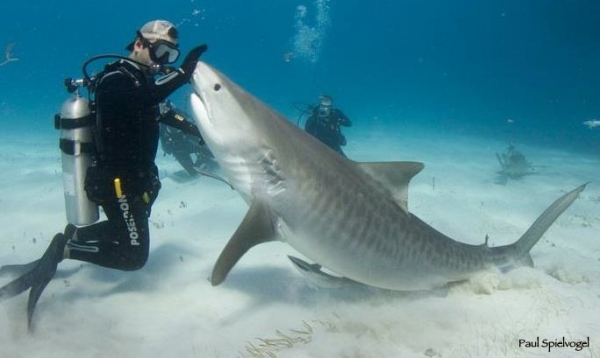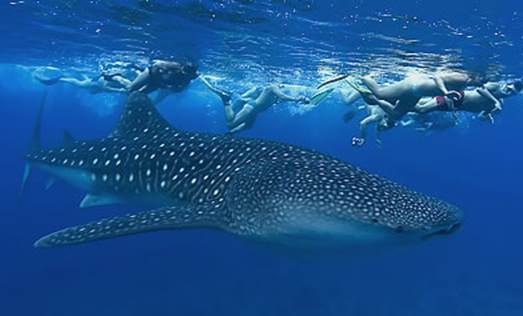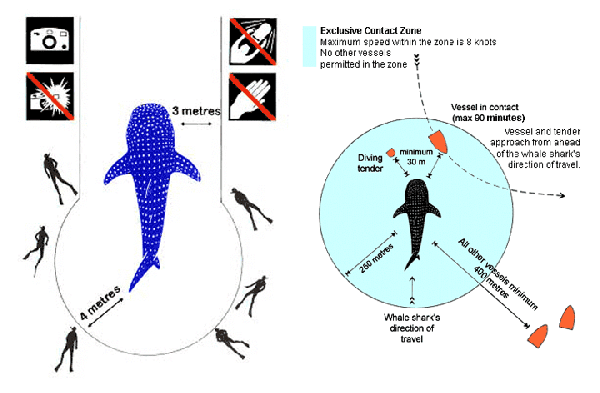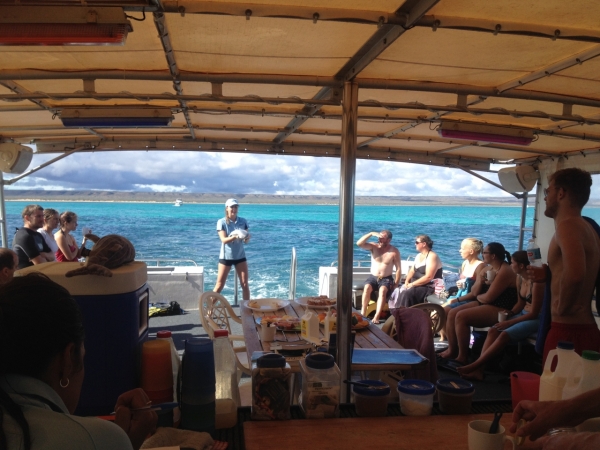Don't miss out on the best jobs!
Subscribe to HelpGoAbroad and weekly we will sent you an email with latest job posts. Provide your email address below
Discovery Channel’s Shark Week has been on air for 26 years, airing mid-summer with millions of viewers tuning in to see the latest footage of Great White Sharks breaching the South African waters as they swallow seals between their gleaming teeth-filled jaws. The general consensus these days is that sharks are bloodthirsty killing machines that are increasingly hunting down humans, but in reality we are the ones who should be feared.
There are several methods attempting to help bring awareness to the plight of the sharks and techniques that are being employed to help people understand the beauty and importance of sharks to a flourishing marine ecosystem. One of the most publicly accessed approaches is eco-tourism. When people experience sharks face to face, they are introduced to the idea of seeing it for the magnificent animal it is rather than the killer that Hollywood has made sharks out to be. The more people are able to recognize the shark as an integral part of the world, the more they will be conscious consumers of shark projects as well as advocates for the preservation of them.
Cage diving
Controversial in the conservation scene, yet revered by the tourism industry, cage diving is a thrilling peek into what its like to be face to face with some of the fiercest predators in the ocean. Cage diving is typically done in areas where there are concentrations of great white sharks, but sometimes companies offer diving with other species of apex predator, such as tiger sharks. These experiences are available all over the world, but are a dime a dozen in South Africa (Gansbaai) and Australia where great white sharks tend to dwell. There are a multitude of issues raised by scientists and conservationists about the sustainability of cage diving, one of the biggest being that it is teaching the sharks unnatural behaviour as they bait them with the smell and taste of blood, yet offer no redemptive food rewards despite the invitation. The controversy surrounding cage diving is more thoroughly explained in this article by Andrew Evans of National Geographic Traveler.
If you are interested in learning more about the shark cage diving industry, some of the companies will post internships online through marine college program websites, or if you happen to be in the area and have experience with boats, sharks or tour guiding, you might have a chance at working with one of these companies. Just be aware that the allure of the thrill-seeking employer may shift the more you understand about sharks and the ways that tourism corrupts their natural behaviour.
Whale Sharks
Less aggressive but attractive in its own way, the exceptionally popular tourist activity of swimming with the biggest fish in the ocean, the whale shark is a double-edged sword. The whale shark can grow up to about 14 meters in length, but despite its large size, its diet consists only of plankton and its teeth are smaller than a grain of rice! Its mouth looks as though it could easily swallow a human whole, but these peaceful filter feeders are happy to cruise through tropical regions in search of plankton, simplifying the jobs of tourist companies as they swim just beneath the surface of the water, so even beginner swimmers can join in the experience. The opportunity to swim with whale sharks is different depending on the particular destination you go to, as there are tours offered in the Philippines, Australia, Seychelles, and Belize to name some of the most popular spots. Each country has their own methods and there are even discrepancies in different regions of a single country. What companies offer tourists is the chance to swim next to the biggest fish in the sea, while still making them feel safe, educating them about the whale shark and sometimes including a meal and other marine life experiences such as snorkel tours.
The important thing to know about this intentional, though not always authentic, form of eco-tourism is that although there may be regulations such as not touching the whale shark, keeping a certain distance between you and the whale shark or time restrictions on how long you can swim with the shark, there are tourists that will disobey and even guides who will compromise the rules as a way to make more tips. The countries that are less developed such as the Philippines have several issues with their whale shark tourism. In Oslob, Cebu, the locals were so desperate to maintain the presence of the whale sharks that they began consistently feeding the whale sharks. This later progressed into rigging up a net around the bay where they were aggregating, and although there are two openings on the net, it does not provide easy access to the ocean. In Donsol, in the Bicol Region of the Philippines, the whale sharks are free to roam, but the guides have a tendency to disregard the rule about only having one boat near one whale shark at a time, and instead as many as thirty boats will overwhelm the shark with its cacophonic motors, and the splashing and thrashing of the tourists clambering for a sight of the big fish. Similar to cage diving, the tourism industry continues to alter the sharks’ natural patterns and behavior for the benefit of their pockets.
A very successful instance of whale shark eco-tourism can be experienced in Exmouth, in Western Australia. Companies here such as Kings Ningaloo Reef tours thoroughly respect the regulations for all the marine wildlife in the area, and have very professional staff to help guide and educate the tourists on the boat. If you are interested in working with whale shark eco-tourism, in Donsol in the Philippines, the WWF has an office and conducts whale shark tracking research and take on volunteers each season (October-April). If you are interested in opportunities in Australia, the whale shark companies are one of the main industries in Exmouth, so you’ll have to get into town very early if you would like a position on one of the boats as a guide, deck hand or even as a receptionist in the office.
Be A Conscious Eco-tourist
The main goal of tourist companies is to lure you and your wallet in to their business, so there will be several companies that will profess sustainable and safe methods compared to other companies, but many of them understand the keywords that draw people in. Do thorough research before aligning yourself with a specific tour company by asking a lot of questions, reading reviews online and exploring all of your options. If an internship, work or volunteer position within this industry is your goal, background research is just as crucial to make sure you are pursuing wholesome companies as well as making sure you understand everything you are obligating yourself to by becoming an employee.
Sign in to publish a comment





Be the first to comment on this post.